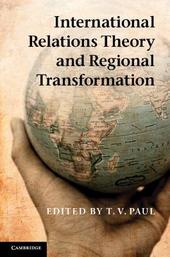
|
International Relations Theory and Regional Transformation
Paperback / softback
Main Details
| Title |
International Relations Theory and Regional Transformation
|
| Authors and Contributors |
Edited by T. V. Paul
|
| Physical Properties |
| Format:Paperback / softback | | Pages:320 | | Dimensions(mm): Height 228,Width 152 |
|
| ISBN/Barcode |
9781107604551
|
| Classifications | Dewey:327 |
|---|
| Audience | | Professional & Vocational | |
|---|
| Illustrations |
3 Line drawings, black and white
|
|
Publishing Details |
| Publisher |
Cambridge University Press
|
| Imprint |
Cambridge University Press
|
| Publication Date |
23 February 2012 |
| Publication Country |
United Kingdom
|
Description
Regional transformation has emerged as a major topic of research during the past few decades, much of it seeking to understand how a region changes into a zone of conflict or cooperation and how and why some regions remain in perpetual conflict. Although the leading theoretical paradigms of international relations have something to say about regional order, a comprehensive treatment of this subject is missing from the literature. This book suggests that cross-paradigmatic engagement on regional orders can be valuable if it can generate theoretically innovative, testable propositions and policy-relevant ideas. The book brings together scholars from the dominant IR perspectives aiming to explain the regional order issue through multidimensional and multi-causal pathways and seeking meeting points between them. Using insights from IR theory, the contributors offer policy-relevant ideas which may benefit conflict-ridden regions of the world.
Author Biography
T. V. Paul is Director of the McGill/University of Montreal Centre for International Peace and Security Studies (CIPSS) and James McGill Professor of International Relations in the Department of Political Science at McGill University. He specialises in International Relations, especially international security, regional security and South Asia.
Reviews'Can regions transform themselves from zones of conflict to zones of cooperation and if so how? In addressing this core question, this volume skilfully bridges theoretical divides and offers strong comparative analysis on different trajectories of regional transformation, with some thought-provoking conclusions.' Louise Fawcett, St Catherine's College, University of Oxford 'This up-to-date and carefully crafted book delivers on its main promise. With an explicit focus on theories of international relations it inquires into the multidimensional and multi-causal pathways that create regional orders. An outstanding group of specialists provide illuminating and cross-paradigmatic perspectives covering most of the world's main regions.' Peter J. Katzenstein, Walter S. Carpenter, Jr Professor of International Studies, Cornell University 'The great strength of this book is the range of scholarly perspectives represented. Realists, liberals, constructivists, and others offer competing logics and claims evaluated both quantitatively and qualitatively. No previous book has been anywhere near so comprehensive in its theoretical treatment of regional transformation. This book will be the definitive reference on regional transformation for some time to come.' Douglas Lemke, Pennsylvania State University 'A vigorous revitalization of theory and research at the regional level of analysis, comparing and blending the three dominant theoretical perspectives in international politics today. The contributors' surveys and assessments of the literature and major research findings, and their stimulating displays of research techniques, all in a clear and coherent fashion, offer an excellent resource for scholars and students.' Patrick M. Morgan, Tierney Chair in Global Peace and Conflict Studies, University of California, Irvine 'Much of the most interesting work on international integration is now concerned with regional networks of organizations and commerce. This book gives a great window on what's happening in scholarship and in the world.' Bruce Russett, Dean Acheson Research Professor of International Relations, Yale University
|